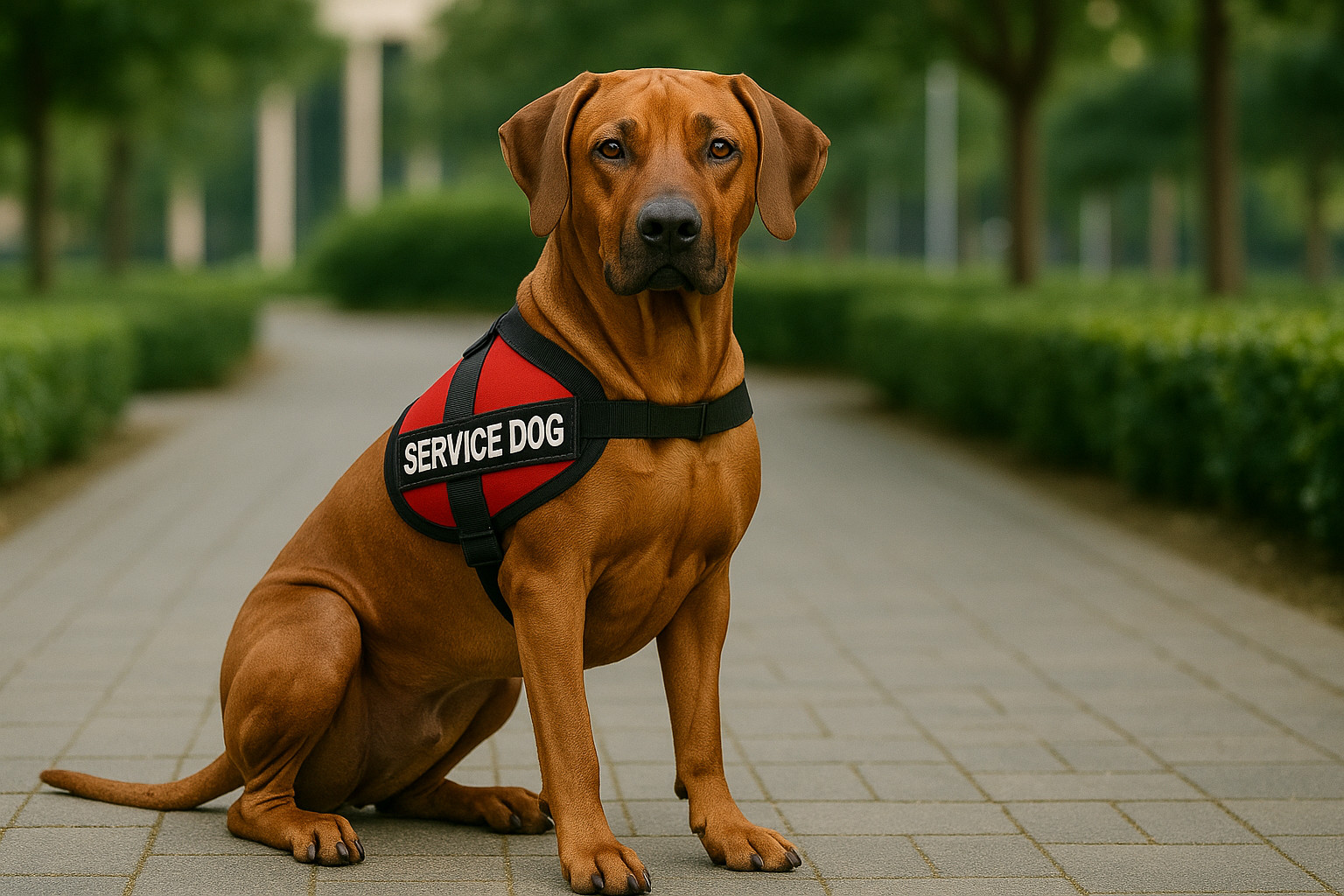Rhodesian Ridgeback as a Service Dog

Service dogs are renowned for their ability to assist with a variety of tasks and support individuals with disabilities. Among the many breeds employed in service dog roles, the Rhodesian Ridgeback, a less common choice, offers unique characteristics that can be valuable in specific scenarios. Let's delve into the detailed nature of the Rhodesian Ridgeback and evaluate their potential as service dogs.
Rhodesian Ridgeback Overview
Physical Characteristics
The Rhodesian Ridgeback is a large, muscular breed originally developed in Southern Africa. Known for their distinctive "ridge" of hair along their back growing in the opposite direction to the rest of the coat, these dogs possess a commanding presence:
- Size and Strength: Typically standing between 24 to 27 inches at the shoulder and weighing between 70 to 85 pounds, the breed is robust and powerful, capable of significant physical feats. This strength can be advantageous in roles requiring physical support, such as mobility assistance.
- Energy Levels: Ridgebacks are renowned for their endurance and ability to cover great distances with ease. While they do not have boundless energy like some herding breeds, they require regular exercise to maintain optimal health and happiness.
- Coat and Appearance: The short, dense coat of the Rhodesian Ridgeback is relatively easy to maintain, needing only occasional grooming. Their dignified appearance, coupled with their physical presence, can act as a deterrent to threats, which may be beneficial for individuals needing a personal protection element.
Temperament and Attitude
Rhodesian Ridgebacks are known for their loyal and independent nature. Their temperament greatly impacts their suitability as service dogs:
- Loyalty and Bonding: They form strong bonds with their family, displaying an exceptional level of loyalty. This makes them dedicated companions, potentially offering great emotional support to their handler.
- Intelligence: They are highly intelligent, which can be a double-edged sword. While intelligence aids in learning complex commands, their independent nature can sometimes manifest as stubbornness, requiring patient, consistent training methods.
- Protective Instincts: Bred to hunt lions, Ridgebacks have an inherent protective instinct. This trait can be harnessed positively in service roles requiring personal protection or alerting the presence of strangers; however, it necessitates thorough socialization to ensure they remain composed in diverse public environments.
Types of Service Work
The unique attributes of the Rhodesian Ridgeback influence the types of service work for which they are most suited:
- Mobility Assistance: The breed's strength and size make them ideal candidates for mobility support roles, where they can assist in stabilizing, retrieving items, or providing physical support for individuals with balance or mobility challenges.
- Emotional Support: Given their loyal and calm demeanor, they can serve as excellent emotional support animals, offering a comforting presence. Their strong bond with their handler can provide emotional stability and companionship.
- Alert Roles: Their intelligence and sensory capabilities can be directed towards medical alert roles, although they're not as naturally predisposed as some other breeds known for scent work. Proper training can enable them to effectively assist in scenarios such as alerting to seizures or diabetic emergencies.
Health Considerations
While the Rhodesian Ridgeback is generally considered a healthy breed, there are specific health issues to be vigilant about:
- Hip Dysplasia: Like many large breeds, they are susceptible to hip dysplasia, a condition that can impact their ability to perform certain tasks. Regular veterinary check-ups and preventive measures can help manage this risk.
- Dermoid Sinus: A congenital skin defect occasionally seen in Ridgebacks, it must be addressed early to prevent complications. Responsible breeding practices help minimize its occurrence.
- Thyroid and Cancer: Some Ridgebacks are predisposed to thyroid issues and certain cancers, underlining the importance of routine health screenings.
- Exercise Needs: Maintaining a regular exercise regimen is crucial to prevent obesity and promote joint health.
Training and Suitability
Training a Rhodesian Ridgeback as a service dog demands expertise and persistence due to their distinct combination of traits:
- Trainability: Their intelligence is beneficial for learning commands, but their independent streak can lead to moments of stubbornness. Training programs should be adaptive, employing positive reinforcement techniques to maintain engagement and achieve consistent results.
- Socialization: Early and ongoing socialization is key to ensuring a well-mannered service dog that remains calm in a variety of settings. Exposure to different environments, people, and other animals is essential for developing a balanced demeanor.
- Adaptability: Their ability to adapt to different tasks and environments makes them versatile service dogs, provided they are well-trained and socialized.
Summary of Rhodesian Ridgeback
To summarize, the Rhodesian Ridgeback, with its unique blend of physical and temperamental traits, can serve as an exceptional service dog under the right conditions:
- Strengths:
- Large size and strength suitable for mobility assistance
- Loyal bond and protective instincts
- High intelligence and trainability
- Challenges:
- Potential stubbornness requiring patient training
- Health considerations such as hip dysplasia
- Need for thorough socialization to mitigate protective instincts
- Ideal Service Roles:
- Mobility assistance
- Emotional support
- Select medical alert scenarios with specialized training
In conclusion, while the Rhodesian Ridgeback may not fit the typical profile of a service dog in every respect, they possess qualities that, when properly channeled, can make them invaluable companions in specific service roles. Thorough consideration of their unique needs and attributes is essential to successfully integrate them into a service capacity.











